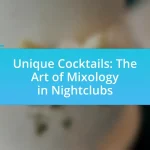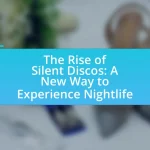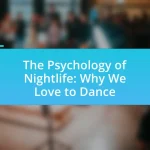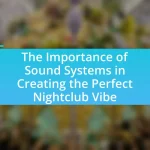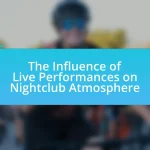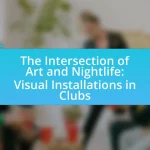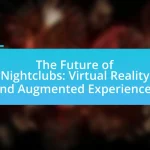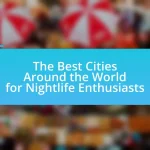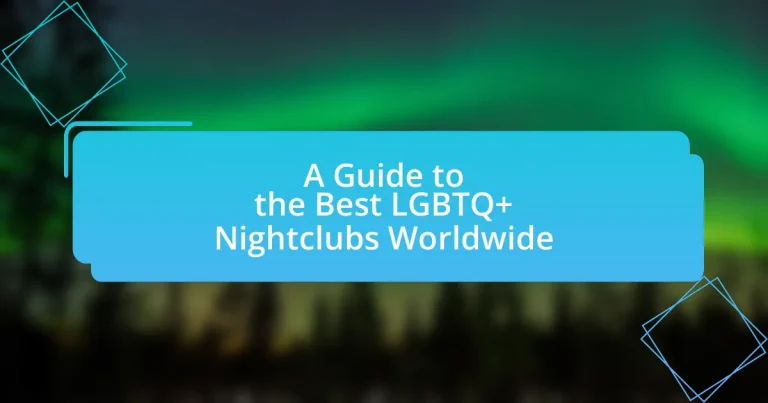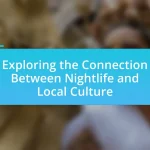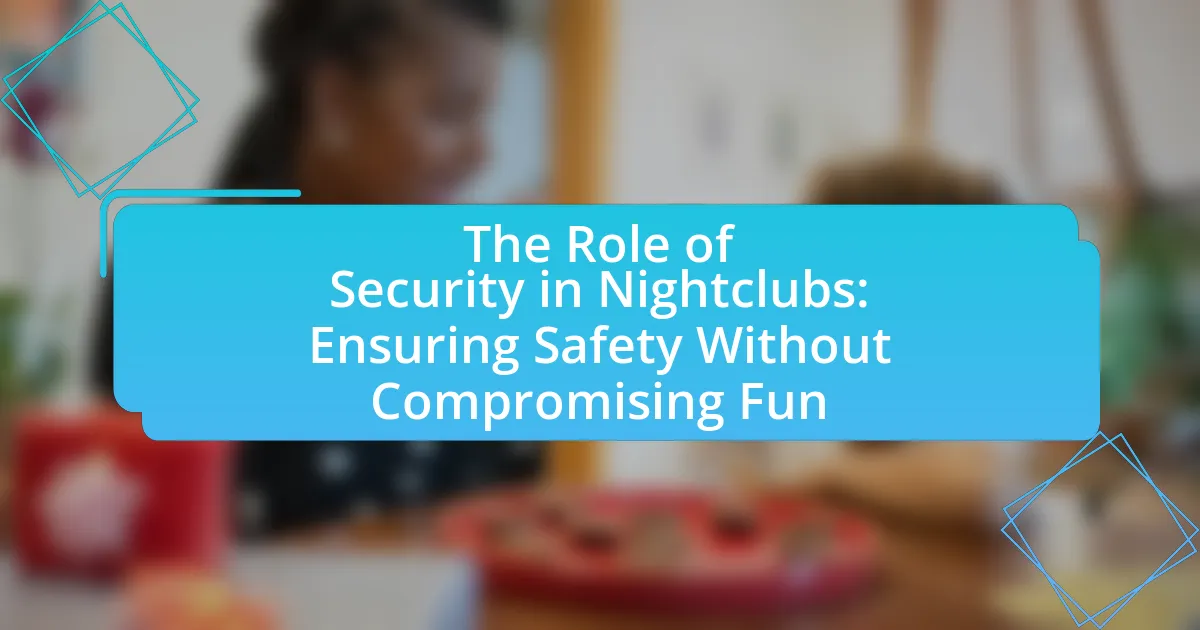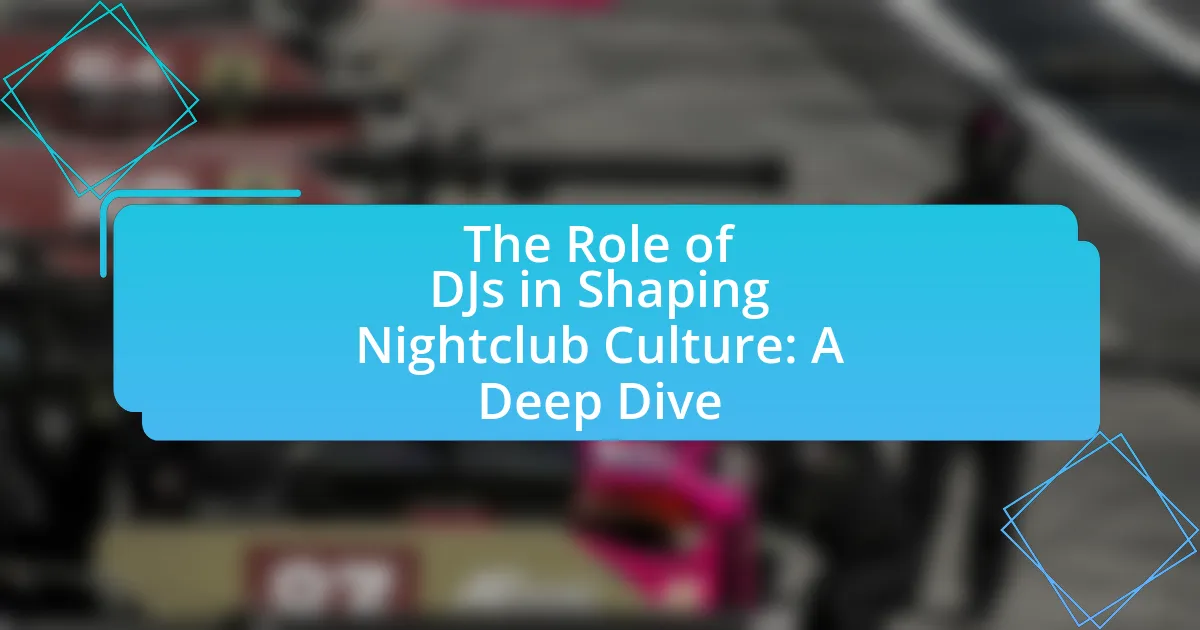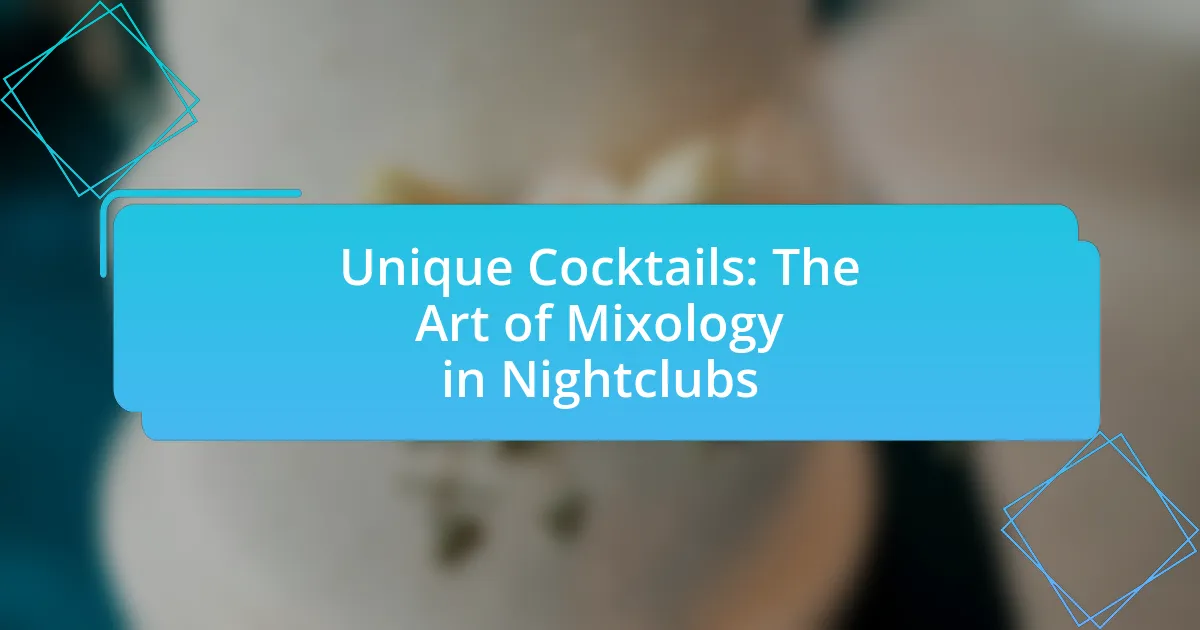The article provides a comprehensive guide to the best LGBTQ+ nightclubs worldwide, highlighting notable venues such as Berghain in Berlin, The Stonewall Inn in New York City, and Heaven in London. It explores how LGBTQ+ nightclubs differ from traditional nightclubs by emphasizing inclusivity and community, and discusses unique features such as themed events, drag shows, and diverse entertainment options. Additionally, the article examines the importance of nightlife for the LGBTQ+ community, detailing how these venues contribute to cultural identity, community building, and social support. It also offers practical tips for choosing a nightclub, ensuring safety, and enhancing the overall experience for patrons.

What are the Best LGBTQ+ Nightclubs Worldwide?
The best LGBTQ+ nightclubs worldwide include Berghain in Berlin, known for its techno music and inclusive atmosphere; The Stonewall Inn in New York City, a historic site of the LGBTQ+ rights movement; and Heaven in London, famous for its vibrant drag shows and diverse crowd. These venues are recognized for their significant cultural impact, unique experiences, and commitment to creating safe spaces for the LGBTQ+ community. Berghain has been a staple since 2004, attracting international visitors, while The Stonewall Inn was designated a National Historic Landmark in 2000, highlighting its importance in LGBTQ+ history. Heaven, established in 1979, continues to be a leading nightlife destination, hosting events that celebrate LGBTQ+ culture.
How do LGBTQ+ nightclubs differ from traditional nightclubs?
LGBTQ+ nightclubs differ from traditional nightclubs primarily in their focus on inclusivity and community for LGBTQ+ individuals. These venues often provide a safe space where patrons can express their identities freely, which is less emphasized in traditional nightclubs. For example, LGBTQ+ nightclubs frequently host events that celebrate queer culture, such as drag shows and pride parties, fostering a sense of belonging and acceptance. Additionally, studies indicate that LGBTQ+ nightclubs often prioritize diverse representation in their entertainment and staff, contrasting with the more mainstream approach of traditional nightclubs. This commitment to inclusivity and representation is a defining characteristic that sets LGBTQ+ nightclubs apart.
What unique features do LGBTQ+ nightclubs offer to their patrons?
LGBTQ+ nightclubs offer unique features such as inclusive environments, themed events, and diverse entertainment options tailored to the community. These venues prioritize safety and acceptance, creating spaces where patrons can express their identities freely. For instance, many LGBTQ+ nightclubs host drag shows, dance parties, and pride events that celebrate queer culture, fostering a sense of belonging. Additionally, these clubs often provide gender-neutral restrooms and staff training on inclusivity, enhancing the overall experience for all patrons. Such features are essential in promoting a welcoming atmosphere, as evidenced by the significant role these clubs play in LGBTQ+ social life and community building.
How do LGBTQ+ nightclubs create inclusive environments?
LGBTQ+ nightclubs create inclusive environments by implementing policies and practices that prioritize safety, representation, and community engagement. These venues often establish anti-discrimination policies, ensuring that all patrons, regardless of sexual orientation or gender identity, feel welcome and respected. Additionally, many LGBTQ+ nightclubs feature diverse programming, including performances by queer artists and events that celebrate various identities, which fosters a sense of belonging. Research indicates that inclusive spaces contribute to mental well-being and community cohesion, as highlighted in studies by the Williams Institute, which found that LGBTQ+ individuals report higher levels of satisfaction in environments that affirm their identities.
Why is the nightlife scene important for the LGBTQ+ community?
The nightlife scene is important for the LGBTQ+ community because it provides a safe space for self-expression and socialization. These venues often serve as cultural hubs where individuals can connect with others who share similar experiences and identities, fostering a sense of belonging. Historically, LGBTQ+ nightlife has been crucial in the fight for rights and visibility, with establishments like Stonewall Inn playing pivotal roles in activism. According to a study by the Williams Institute, LGBTQ+ individuals report higher levels of social support and well-being when they engage in community spaces, highlighting the nightlife’s role in promoting mental health and community cohesion.
What role do nightclubs play in LGBTQ+ culture and identity?
Nightclubs serve as vital spaces for LGBTQ+ culture and identity by providing safe environments for self-expression, community building, and socialization. These venues often host events that celebrate LGBTQ+ pride, such as drag shows and themed parties, which foster a sense of belonging and visibility within the community. Historically, nightclubs have been pivotal in the LGBTQ+ rights movement, with venues like the Stonewall Inn being sites of significant activism, exemplifying their role as both social hubs and catalysts for change. Furthermore, studies indicate that nightlife can enhance mental well-being by offering a refuge from societal discrimination, reinforcing the importance of nightclubs in the cultural fabric of LGBTQ+ identity.
How do LGBTQ+ nightclubs contribute to community building?
LGBTQ+ nightclubs contribute to community building by providing safe spaces for individuals to express their identities and connect with others. These venues foster a sense of belonging and acceptance, which is crucial for marginalized communities. Research indicates that LGBTQ+ individuals often face discrimination and isolation; thus, nightclubs serve as vital social hubs where people can form friendships, engage in activism, and celebrate their culture. For example, studies show that participation in LGBTQ+ nightlife can enhance social networks and support systems, leading to improved mental health outcomes.
What factors should be considered when choosing an LGBTQ+ nightclub?
When choosing an LGBTQ+ nightclub, consider the venue’s inclusivity, safety, entertainment options, and community reputation. Inclusivity ensures that the nightclub welcomes diverse identities and expressions, fostering a sense of belonging. Safety is paramount; look for venues with visible security measures and a zero-tolerance policy for harassment. Entertainment options, such as drag shows, live music, or themed nights, enhance the experience and attract a vibrant crowd. Lastly, the community reputation can be assessed through reviews and word-of-mouth, indicating how well the nightclub serves and supports the LGBTQ+ community.
How does location impact the experience at LGBTQ+ nightclubs?
Location significantly impacts the experience at LGBTQ+ nightclubs by influencing accessibility, cultural acceptance, and the overall atmosphere. Nightclubs situated in urban areas with a vibrant LGBTQ+ community tend to offer a more inclusive environment, attracting diverse crowds and fostering a sense of belonging. For instance, cities like San Francisco and New York have established nightlife scenes that cater specifically to LGBTQ+ individuals, providing safe spaces for self-expression. Additionally, the proximity to other LGBTQ+ friendly venues enhances the overall experience, as patrons can easily move between locations, creating a more dynamic nightlife. Studies indicate that areas with higher levels of LGBTQ+ acceptance correlate with more successful and popular nightclubs, reinforcing the importance of location in shaping the nightlife experience.
What amenities and services enhance the nightclub experience?
Amenities and services that enhance the nightclub experience include high-quality sound systems, vibrant lighting, VIP areas, and exceptional customer service. High-quality sound systems ensure that music is delivered clearly and powerfully, creating an immersive atmosphere that encourages dancing and enjoyment. Vibrant lighting, including LED displays and laser shows, adds visual excitement and enhances the overall ambiance, making the space more inviting and energetic. VIP areas provide exclusive experiences for guests seeking privacy and luxury, often featuring bottle service and dedicated staff. Exceptional customer service, characterized by attentive and friendly staff, contributes significantly to a positive experience, ensuring that patrons feel valued and catered to throughout their visit.
What are some of the most popular LGBTQ+ nightclubs around the world?
Some of the most popular LGBTQ+ nightclubs around the world include Berghain in Berlin, The Stonewall Inn in New York City, and Heaven in London. Berghain is renowned for its techno music and strict door policy, making it a cultural landmark in the LGBTQ+ community. The Stonewall Inn is historically significant as the site of the 1969 Stonewall riots, which were pivotal in the fight for LGBTQ+ rights. Heaven, one of the largest gay clubs in London, is famous for its vibrant atmosphere and diverse events. These clubs are celebrated not only for their entertainment but also for their contributions to LGBTQ+ culture and history.
Which cities are known for their vibrant LGBTQ+ nightlife?
Cities known for their vibrant LGBTQ+ nightlife include San Francisco, New York City, Berlin, and Sydney. San Francisco is renowned for its historic Castro District, which has numerous bars and clubs catering to the LGBTQ+ community. New York City features the iconic Stonewall Inn and a diverse range of nightlife options in neighborhoods like Greenwich Village and Chelsea. Berlin is famous for its open and eclectic nightlife, particularly in areas like Schöneberg and Kreuzberg, known for their inclusive atmosphere. Sydney hosts the annual Mardi Gras festival, showcasing a lively LGBTQ+ scene in areas such as Oxford Street. These cities are recognized for their rich cultural contributions and active LGBTQ+ communities, making them top destinations for nightlife.
What makes each of these nightclubs unique?
Each of the nightclubs in the guide is unique due to distinct features that cater to the LGBTQ+ community. For instance, one nightclub may be renowned for its vibrant drag shows, showcasing local talent and attracting large crowds, while another might be celebrated for its inclusive atmosphere and diverse music genres, creating a welcoming space for all identities. Additionally, some nightclubs may offer themed nights or special events that highlight cultural celebrations, further enhancing their uniqueness. The combination of these elements, such as performance quality, atmosphere, and community engagement, solidifies each nightclub’s individual identity within the LGBTQ+ nightlife scene.
How can visitors ensure a safe and enjoyable experience at LGBTQ+ nightclubs?
Visitors can ensure a safe and enjoyable experience at LGBTQ+ nightclubs by being aware of their surroundings, respecting the venue’s rules, and engaging with staff if any issues arise. Awareness includes recognizing emergency exits and understanding the club’s layout, which enhances personal safety. Respecting the venue’s rules, such as dress codes and behavior expectations, fosters a positive atmosphere for everyone. Engaging with staff, who are often trained to handle various situations, can provide assistance and support, ensuring a more secure environment. These practices contribute to a welcoming and enjoyable experience, as LGBTQ+ nightclubs often prioritize safety and inclusivity for all patrons.
What safety measures should patrons be aware of?
Patrons should be aware of several safety measures when visiting LGBTQ+ nightclubs. First, it is essential to remain aware of your surroundings and trust your instincts; if a situation feels uncomfortable, seek assistance from staff or security. Additionally, patrons should keep personal belongings secure and avoid excessive alcohol consumption to maintain awareness. Many venues implement a zero-tolerance policy for harassment and discrimination, which patrons should report immediately if witnessed. Furthermore, knowing the location of emergency exits and having a plan for transportation home can enhance safety. These measures are crucial for ensuring a safe and enjoyable experience in nightlife settings.
How can visitors respect the culture and community of LGBTQ+ nightclubs?
Visitors can respect the culture and community of LGBTQ+ nightclubs by adhering to the established norms and values of inclusivity and acceptance. Engaging with the community in a respectful manner, such as using appropriate language and avoiding stereotypes, fosters a welcoming environment. Additionally, supporting LGBTQ+ artists and performers by attending their shows and purchasing merchandise demonstrates appreciation for their contributions. According to a study by the Williams Institute, LGBTQ+ nightlife plays a crucial role in community building and cultural expression, highlighting the importance of respectful engagement.

What types of events are typically hosted at LGBTQ+ nightclubs?
LGBTQ+ nightclubs typically host events such as drag shows, dance parties, themed nights, and live performances. These events cater to the community by providing a space for self-expression and celebration. For instance, drag shows often feature local and national performers, showcasing talent and creativity, while themed nights may include events like Pride celebrations or LGBTQ+ history nights, fostering inclusivity and awareness. Additionally, many nightclubs host special events during significant dates, such as Pride Month, to engage the community and promote visibility.
How do themed nights enhance the nightclub experience?
Themed nights enhance the nightclub experience by creating a unique atmosphere that attracts diverse crowds and fosters a sense of community. These events often feature specific music genres, dress codes, or cultural themes, which encourage patrons to engage more deeply with the environment and each other. For instance, LGBTQ+ nightclubs frequently host drag shows or pride-themed events, which not only entertain but also celebrate identity and inclusivity, making attendees feel more connected and accepted. Research indicates that themed events can increase customer retention and satisfaction, as they provide memorable experiences that encourage repeat visits.
What are some popular themes for LGBTQ+ nightclub events?
Popular themes for LGBTQ+ nightclub events include Pride celebrations, drag shows, themed costume parties, and retro nights. Pride celebrations often feature vibrant decorations and performances that celebrate LGBTQ+ identities, while drag shows showcase talented performers in elaborate costumes, drawing large crowds. Themed costume parties encourage attendees to express their creativity and individuality, often revolving around specific concepts like ‘Masquerade’ or ‘Futuristic.’ Retro nights focus on music and styles from past decades, creating a nostalgic atmosphere that appeals to diverse age groups. These themes are widely recognized and frequently utilized in LGBTQ+ nightlife to foster community and inclusivity.
How do drag shows contribute to the entertainment at these venues?
Drag shows significantly enhance the entertainment value at LGBTQ+ nightclubs by providing vibrant performances that celebrate diversity and self-expression. These shows often feature elaborate costumes, lip-syncing, and comedic elements, creating an engaging atmosphere that attracts diverse audiences. According to a study published in the Journal of Homosexuality, drag performances foster community bonding and promote acceptance, making them a central aspect of nightlife in these venues. The combination of artistry and entertainment in drag shows not only entertains but also educates audiences about LGBTQ+ culture, further solidifying their importance in the nightlife scene.
What role do DJs and performers play in LGBTQ+ nightclubs?
DJs and performers are central to the atmosphere and experience in LGBTQ+ nightclubs, serving as key figures who create and enhance the celebratory environment. They curate music and performances that resonate with the community, often reflecting its diversity and cultural significance. For instance, renowned DJs like Honey Dijon and performers such as RuPaul have played pivotal roles in shaping the sound and style of LGBTQ+ nightlife, drawing large crowds and fostering a sense of belonging. Their contributions not only entertain but also empower individuals, making nightclubs spaces for self-expression and social connection within the LGBTQ+ community.
How do DJs curate music to cater to the LGBTQ+ audience?
DJs curate music for the LGBTQ+ audience by selecting tracks that resonate with the community’s diverse tastes and cultural influences. They often incorporate popular anthems, remixes, and underground hits that reflect LGBTQ+ experiences, ensuring a vibrant and inclusive atmosphere. Research indicates that music genres like house, pop, and disco are particularly favored within LGBTQ+ spaces, as they have historical ties to the community, fostering a sense of belonging and celebration. Additionally, DJs may pay attention to current trends and requests from the audience, adapting their playlists to create an engaging and dynamic experience that honors the unique identity of LGBTQ+ individuals.
What types of performances are commonly featured in LGBTQ+ nightclubs?
LGBTQ+ nightclubs commonly feature drag performances, live music, and dance shows. Drag performances often include lip-syncing, comedy, and elaborate costumes, showcasing the artistry and creativity of drag queens and kings. Live music can range from local artists to well-known performers, often highlighting LGBTQ+ themes and experiences. Dance shows typically involve choreographed routines that celebrate diversity and self-expression, creating an inclusive atmosphere. These performance types are integral to the culture of LGBTQ+ nightclubs, fostering community and entertainment.

How can one find the best LGBTQ+ nightclubs in a new city?
To find the best LGBTQ+ nightclubs in a new city, one should utilize online resources such as LGBTQ+ community websites, social media platforms, and local event listings. Websites like GayCities and Meetup provide user-generated reviews and event information specific to LGBTQ+ venues. Additionally, checking platforms like Yelp and Google Maps for ratings and comments can offer insights into the atmosphere and clientele of various nightclubs. Engaging with local LGBTQ+ groups on social media can also yield recommendations based on firsthand experiences. According to a 2021 survey by the Williams Institute, cities with vibrant LGBTQ+ communities often have a higher concentration of inclusive nightlife options, making these resources particularly valuable for newcomers.
What resources are available for discovering LGBTQ+ nightlife?
Resources for discovering LGBTQ+ nightlife include dedicated websites, mobile apps, and social media platforms. Websites like GayCities and LGBTQ+ Travel provide comprehensive listings of LGBTQ+ friendly venues, events, and nightlife options in various cities. Mobile apps such as Grindr and HER not only facilitate social connections but also feature event listings and venue recommendations tailored for the LGBTQ+ community. Additionally, social media platforms like Instagram and Facebook often showcase local LGBTQ+ events and nightlife through community pages and event promotions, making it easier for individuals to find and engage with nightlife options in their area.
How can social media and apps help in finding LGBTQ+ nightclubs?
Social media and apps facilitate the discovery of LGBTQ+ nightclubs by providing real-time information, user-generated reviews, and community engagement. Platforms like Instagram and Facebook allow users to follow specific venues, view event promotions, and access photos that showcase the atmosphere and crowd. Additionally, apps such as Grindr and HER feature location-based services that highlight nearby LGBTQ+ friendly venues, including nightclubs, based on user preferences and ratings. Research indicates that 70% of LGBTQ+ individuals use social media to connect with their community, making these platforms essential for finding inclusive nightlife options.
What role do local LGBTQ+ organizations play in promoting nightlife?
Local LGBTQ+ organizations play a crucial role in promoting nightlife by creating safe spaces and fostering community engagement. These organizations often organize events, support local venues, and advocate for LGBTQ+ rights, ensuring that nightlife options are inclusive and accessible. For instance, events like Pride celebrations and drag shows, often facilitated by these organizations, attract diverse crowds and stimulate local economies. Additionally, studies have shown that cities with active LGBTQ+ organizations tend to have more vibrant nightlife scenes, as these groups help to cultivate a sense of belonging and visibility within the community.
What tips can enhance the experience at LGBTQ+ nightclubs?
To enhance the experience at LGBTQ+ nightclubs, attendees should engage with the community by participating in events and themed nights, as these foster a sense of belonging and connection. Additionally, dressing in a way that expresses personal identity can boost confidence and enjoyment, as self-expression is a core value in LGBTQ+ spaces. Staying informed about the venue’s policies on inclusivity and safety can also enhance the experience, ensuring a welcoming environment. According to a study by the Williams Institute, LGBTQ+ individuals report higher satisfaction in spaces that actively promote inclusivity and community engagement.
How should one prepare for a night out at an LGBTQ+ nightclub?
To prepare for a night out at an LGBTQ+ nightclub, one should choose an outfit that reflects personal style while adhering to the venue’s dress code, if applicable. Many LGBTQ+ nightclubs celebrate self-expression and creativity, so vibrant and bold clothing is often encouraged. Additionally, it is essential to plan transportation in advance, ensuring safe travel to and from the venue, as many clubs can be located in busy urban areas.
Research indicates that LGBTQ+ nightlife can foster community and acceptance, making it important to approach the night with an open mind and a respectful attitude towards others. Familiarizing oneself with the club’s events or theme nights can enhance the experience, as many venues host drag shows, dance parties, or themed events that cater to diverse interests.
What etiquette should be followed in LGBTQ+ nightlife settings?
In LGBTQ+ nightlife settings, individuals should prioritize respect, consent, and inclusivity. Respecting personal space and boundaries is crucial, as is seeking consent before initiating any physical contact, such as dancing closely or touching someone. Inclusivity involves recognizing and celebrating diverse identities, ensuring that language and behavior are welcoming to all attendees. Additionally, being mindful of noise levels and maintaining a friendly demeanor contributes to a positive atmosphere. These practices foster a safe and enjoyable environment, which is essential in LGBTQ+ spaces where community and acceptance are paramount.


